Baku. 26 December. REPORT.AZ/ The outgoing year 2018 was rich in different developments that had a great influence and changed the global geopolitics. Report has prepared the annual pick of main highlights.
Elections in the countries – Azerbaijan, Georgia and Armenia
The presidential elections in Azerbaijan were held on April 11. Candidate from the Yeni Azerbaijan Party Ilham Aliyev gained a confident victory by garnering 86.03% of votes. The independent candidate , candidates from the United Popular Front of Azerbaijan Gudrat Hasanguliyev and Democratic Party overcame the three percentage limit, while the rest candidates had less than 2% of votes.
Georgia saw the presidential elections on October 28. The first round did not reveal any winner, prompting the need for the second round involving former French diplomat, independent candidate Salome Zurabishvili supported by ruling party ‘Georgian Dream’ and Grigol Vashadze, a candidate from the United National Movemnet, created by Mikheil Saakashvili. By results of the second round on November 28 Zurabishvili gained 59.52% of vote, an almost 20% of gap with her opponent.
The region saw the most turbulent elections in Armenia. The presidential election held in Armenia on March 2 in which Armen Sarkissian was elected, was followed by protests in Yerevan further tagged ‘the velvet revolution’ led by opposition leader Nikol Pashinyan. The protests were triggered by nomination of former president Serzh Sargsyan for premiership. Sargsyan earlier said when quitting his post that he does not intend to run for presidency or premiership and the reforms, including the Constitutional referendum, were made ‘for the sake of democracy and freedom’.
The Armenian government led by Sargsyan resigned in the wake of the ‘velvet revolution’ with Pashinyan assuming premiership on May 8. By his statements, Pashinyan gave a hint that he plans the European integration of the country and Armenia’s withdrawal from the EAEU. Throughout that period, he ‘cleared’ Sargsyan’ team from power. Former president Robert Kocharyan faced charges over the dispersal of March 2008 protests.
Presenting charges to CSTO Secretary General Yuriy Khachaturov of overthrowing the constitutional system in March 2008, which caused scandal and Russia's indignation. On March 2, the CSTO annuled Khachaturov's powers ahead of the term. Today the CSTO new secretary general is not elected and the presidency in the organization was passed on to Belarus.
On October 16, 2018 Pashinyan resigned yet preserving the status of acting Prime Minister of Armenia. On December 9 the country saw extraordinary parliamentary elections, since the National Assembly could not elect the Prime Minister of the country. At these elections Pashinyan’s alliance ‘My Step’ won by garnering 70.43% of votes and Pashinyan again led the government.
Two other key countries of the region - Russia and Turkey - saw presidential elections, too, with Vladimir Putin winning in Russia and Recep Tayyip Erdogan in Turkey.
Azerbaijani political scientist Tofig Abbasov believes that the results of all elections in the South Caucasus region speak for themselves.
“The presidential elections in Georgia showed that this country is committed to developing its own model, therefore, as the play progresses, it experiments, where needed, protects the new system, where needed, and blends its own traditions with the Western European ones, where needed… Elections in Armenia proved that the country still sees a high percentage of manipulations, which will disappoint ordinary voters completely either sooner or later. By no coincidence, the voter turnout in early parliamentary elections was 50%. People in Armenia do not trust elections as a mechanism of revealing the best politicians and teams, and, on the other hand, they realized that the change of people in power structures does not lead to any special changes. It means that much is to be reformed there and the smart and energetic people must come to power to improve the situation and lead the country out of isolation,” the expert said.
Speaking about the situation inside the CSTO and the scandal around general secretary Yuriy Khachaturov with Yerevan suing him, the political expert noted that the situation in the CSTO had strained due to Armenia’s self-inflated ego, which tries to impose its vision and impossible wishes on its partners.
“Yerevan’s fault has showed that instead of demonstrating constructivism in important issues, the Armenian elite is always leaning overcasuistics in a hope to outwit the partners. Its stubbornness in the issue of the CSTO secretary general caused a complete breakdown of Armenian stocks. It was understood by all concerned parties,” Abbasov said.
Convention on the legal status of the Caspian Sea
The signing of the Convention on the legal status of the Caspian Sea by five Caspian littoral states - Azerbaijan, Iran, Kazakhstan, Russia, Turkmenistan - was another remarkable event in the outgoing year. The negotiations on the document had lasted for more than 20 years before it was signed by the heads of the five Caspian littoral states at the summit in Kazakhstan on August 12, 2018.
Notably, a special working group on the level of deputies foreign ministers was created by the Caspian littoral states in 1996 for the purpose of developing the Convention on the legal status of the Caspian Sea.
"The signing of the Convention on the legal status of the Caspian Sea was a really historic event, celebrating the good will of the five littoral states," Azerbaijan's Foreign Minister said regarding the signing of the Convention.
Under the convention, the main area of the Caspian water surface is recognized as a sea, not a lake, with the emanating legal implications. The Caspian Sea remains in the common use by the parties and the bottom and resources are divided by the neighboring states into sectors by agreements between them based on the international law.
Rapprochement between the two Koreas
Talks between the two Koreas in the demilitarized area in Panmunjom in a building with the symbolic name ‘The House of Peace’ could be called a starting point. The event was concluded with the adoption of a joint statement which expresses the readiness of both parties to make steps to reduce military tensions in the Korean peninsula and continue the dialogue.
In the same year the parties agreed the participation of a united delegation at the opening of the Olympic Games, as well as the participation of a joint Korean women’s national team in hockey.
For the first time in 65 years, in April the North Korean leader visited the South, during which the sides held an inter-Korean summit. The two next top level summits were held in May and September with the latter taking place in Pyongyang.
On its part, in order to reduce tensions in the Korean peninsula the United States offered the North Korean authorities to hold the first-ever summit of the heads of the United States and the North Korea. Donald Trump and Kim Jong-un met for the first time in 65 years on June 12 in Singapore. At that time Pyongyang expressed the intention regarding the full denuclearization of peninsula, while the United States vowed to ensure security in response. In October the United States announced the next meeting in the coming months.
Meeting between Putin and Trump
Russia and the United States also made halfhearted attempts to improve their relations in the outgoing year. The Russia-US summit with participation of presidents Vladimir Putin and Donald Trump was initiated by the American side in July. The summit was the first full-format meeting between the Russian and US leaders following Trump’s election as a president. The main topics of negotiations include the improvement of the US-Russian relations, situation in Syria and Ukraine, as well as stability and nonproliferation of the weapons of mass destruction. Though in an interview by results of the meeting the US president called it ‘a good start’ and the results ‘important outcomes’, and Russian leader Putin expressed satisfaction with the talks, referring to their meaningfullness, no agreements were reached for the significant improvement of relations.
‘Yellow vests’ movement in Europe
The end of 2018 was marked by sociopolitical upheavals in Europe. The protests of the so-called ‘yellow vests’ started in France. The initial reason behind manifestations was the increase in prices on fuel due to the oil price hike and then the protesters already started to demand the resignation of the incumbent president of France, Emmanuel Macron.
The protest spilled over other regions of France, and other countries, particularly Holland and Belgium. Several protests of ‘yellow vests’ were also staged in Great Britain, Israel, Poland, Serbia, Germany, Hungary, Bulgaria. The protests in France were gaining steam and were staged every day. On November 20, the French authorities imposed a curfew. On the second week of the protests the police started to use tear gas and water cannons, while ‘yellow vests’ began setting barricades across Paris. On December 10, Macron declared the economic and social emergency state in the country, raised the minimal wage by 1.8%, increased labor and a number of other benefits. Despite the concessions made by the French authorities, the ‘vests’ continued the protests saying the concessions are insufficient.
According to Abbasov, what happens in France now is the struggle of the so-called globalists against their own man in power – Emmanuel Macron, who started ‘to deviate gradually from the rules of the game’.
The expert said the initiative by the French authorities to impose a tax scared the ‘moneybags’ who decided to make people to streets being unwilling to give up the initiative.
"Any rumors that Macron stepped on the US toes by a proposal to create a European army are simply a guess. Strong America is leading among globalists, therefore, it cannot be that Macron did everything himself. The street protests and daring attacks of the manifestants dealt a strong blow on Macron’s positions which was enough for him and others not to set their eyes on the fortune of successful people,” he said.
As for the protests of the ‘yellow vests’ protests, the expert noted that the situation has started to improve and stabilize.
“Those in authorities are obliged to turn to those impoverished and vulnerable since it is difficult to increase political capital without assisting them. However, people from the world of the rich, those who are in authority and distance themselves from the poor, do not want even to hear that someone needs help and needs his life to be improved,” Abbasov said.
He noted that the wealthy people fear minimal financial losses that may grow into global. This makes them act watching their backs with fear,” the expert said.
On his part, senior expert with the US-Azerbaijani Fund of Assistance to Progress Alexei Sinitsin believes that the ‘yellow vests’ movement in France is leftist, anti-globalist and even anti-imperialistic.
“The manifest of the movement is in fact a socialistic program consisting of quite radical demands. For example, ‘to amend the constitution for the interests of the people’s sovereignty and also to allow holding referendums on the people’s initiative’ or ‘quit NATO and EU’. By no coincidence, the positions of left radicalist Jean Luke Melanchone’s party ‘Unconquered France’ have strengthened so much,” Sinitsin said.
He voiced the opinion that Macron’s government and the entire European Union with its bulky bureaucratic system will stand the protest pressure of the ‘vests’.
“But I think that in the political context Europe will move left, this trend has already been observed and it will likely strengthen even further,” the expert believes.
Merkel and Germany
It should be noted that Angela Merkel’s refusal to run for German chancellor’s post, as well as her nonparticipation in the elections in Bundestag and the Christian-Democratic Party and the election of the new head of the party Annegret Kramp-Karrenbauer were important both for EU and the European space, in general. Today the Christian-Democratic Party is viewing the possibility of transferring Merkel’s powers to the new leader of German conservatism Annegret Kramp-Karrenbauer by 2021.
Expert Sinitsin believes that Merkel does not intend to suffer the same fate of her patron and former German chancellor Helmut Kohl whom she almost ‘ate’ by taking his party seat.
“It would rather be better to leave herself, giving a place to the chairperson of her party, her own ‘girl’, in our case Annegret Kramp-Karrenbauer whom she led by the hand up by the hierarchic party stairs to the post of the CDP secretary general,” the expert said.
He pointed that the oldest ally of the party – the Bavarian Christian-Social Union may turn its back to Christian democrats due to Angela Merkel’s migration policy.
“Social-democrats, especially their youth wing, threaten to withdraw from the big coalition with the Christian Democratic Party and Christian Social Union, explaining their intention by the fact that the voters already do not see the difference between the leading German parties. Thus, the coalition may collapse well before 2020. Then the Christian Democratic Party will be led to the elections not by Merkel but by Kramp-Karrenbauer. If she loses, it is her problems, and Angela Merkel will remain the moral authority for all Germans, which she earned throughout all her four terms as a chancellor,” Sinitsin said.
Talks on Brexit
Another event of the outgoing year, so important for Europe, is the process of Britain’s withdrawal from the EU – the so-called Brexit. The problem is that the talks on exit are protracted and the parties have not yet come to an agreement, particularly, due to the border between Ireland and Northern Ireland, and the negotiations have stalled. In the end, the parties came to an agreement, all the EU countries approved the document, but due to the resentment of the British parliamentarians with the process of negotiations and the lack of confidence in Prime Minister Theresa May the voting on the agreement was cancelled and an attempt was taken to vote no-confidence for May. The EU itself started preparations for ‘hard Brexit’ that implies official London’s exit without any agreement.
Expert Sinitsin believes that Brexit will take place anyway, even on unfavorable terms for Britain.
"However, Britain will survive this calamity and even in the short-term perspective it will have a lesser effect on Britons that the postwar collapse of the British empire. But Theresa May with her cabinet will sink into political oblivion,” he said.
The expert noted that Britain is well aware that the whole responsibility ‘for the divorce with the EU’ must lie with May and her supporters, who will not survive Brexit as politicians.
Speaking about EU’s future, the political expert noted that the main drivers of EU in Europe, who propose their initiatives favorable for the United States, are the so-called countries of ‘New Europe’ – Poland and Baltic states.
“In the new year the differences between ‘Old Europe’ – France, Germany, Italy – and ‘New Europe’ will further grow. The farther the Western Europeans distance from the political influence of Washington, the more pressure, including economic pressure, they will insert on the Eastern European outsiders, who were happy to assume the role of the US satellites. Therefore, in 2019 the EU will hold a more independent policy from the White House than in the past years,” Sinitsin said.
He said calls for creating the EU anew are already heard in Europe while the populist and anti-European parties are predicted to win the upcoming elections in the European parliament.
“But as a result of it all the national governments of major European countries will not follow the recommendations of EU’s political institutions, including the European Parliament. Though, I think Europe has no special shocks ahead,” the expert said.
Skripals’ poisoning
Another scandal related to Europe occurred in Great Britain, where former employee of Russia’s head intelligence department Sergey Skripal who has a dual citizenship of Russia and Great Britain, and his daughter Yuliya who arrived from Moscow to visit her father were poisoned with a nerve agent in Saulsberry on March 4. British experts from the secret chemical laboratory ‘Porton-Down’ defined that the Novichok nerve agent was used in poisoning. The expertise held in the chemical labs, selected by the Organization for the Prohibition of Chemical Weapons, later confirmed the conclusion.
Official London accused Moscow of accomplice in the attempted murder of Skripals and violation of the Convention on prohibition of chemical weapons. Moscow, in turn, strongly denied the accusations, pointing that it was a provocation, masterminded by British agents.
Another case of poisoning with A-324 class Novichok agent was recorded in Amesbury in July. British police called the names and published the photos of two Russian citizens, suspected of poisoning Skripals, who, according to them, were the officers of the State Investigation Department and arrived in Britain under false names. The country’s Security Minister put the responsibility for poisoning personally on Russian President Vladimir Putin. Russia again denied the allegations.
Assassination of Saudi journalist in Turkey
In October the world was shocked by the reports on the death of Saudi Journalist Jamal Khashoggi, famous for his criticism of Saudi authorities. Khashoggi was brutally murdered inside the Saudi Consulate in Istanbul on October 2. His body was dismembered and terminated. The murder caused an immediate scandal and tensions in relations between Saudi Arabia and Turkey, the United States and a number of other countries. Turkey’s presidential advisor Yasin Aktay, police officers and Minister on EU Affairs Omer Chelik announced that the operation on murdering Khashoggi involved 15 Saudi agents. On October 25, 2018, the Saudi prosecution admitted that the journalist’s murder was not an accident but a premeditated act. The Washington Post wrote citing the CSI that Khashoggi’s killing was ordered by crown prince Mohammed bin Salman.
Russian expert on the Middle East Igor Pankratenko voiced an opinion that crown prince possibly made the decision to terminate Khashoggi on emotional rather than rational grounds.
"Who was Khashoggi for the prince? An agent of those circles in the Saudi dynasty who hate Mohammed bin Salman, the one who had serious connections in the United States and reported on the real situation in the Kingdom, the real state in the dynasty,” the expert said.
He also noted that the assassinated journalist for a number of reasons could become a leader of the youth secular opposition to the crown prince.
"I seriously doubt if Khashoggi ever wanted that for real but when that information was put before Mohammed bin Salman, he did not have a single doubt, which is why he ordered to settle the issue cardinally: no man – no problem,” the expert believes.
He said in the end the crown prince found himself ‘in an extremely awkward situation’, in the very center of the scandal, which is far from being over.
"Saudi Arabia faced a huge fine from Washington, since it is quite obvious that Trump covered up the crown prince not for nothing but in exchange for gross investments in US economy. Meanwhile, Ankara got strong cards in the negotiations with the United States and earned lots of points in the same race for leadership in the Muslim world where Riyadh is Turkey’s direct competitor,” Pankratenko said.
US withdrawal from Syria
Another remarkable event happened almost at the turn of the year with the United States officially announcing the withdrawal of their troops from Syria. According to US media, the decision was adopted after US and Turkish Presidents Donald Trump and Recep Tayyip Erdogan talked over phone regarding the situation in northeastern Syria.
Pankratenko believes that ‘to start pulling out troops’ and to do so in reality are completely different things.
“Trump said clearly that the international anti-terror coalition will continue its activity in the region. Thus, in reality Americans have a wealth of options to preserve their presence here. Nothing has been completely decided yet, especially if the matter is concerned with Trump. This is a multilayer party where adoption of decisions on one of the levels does not necessarily mean the achievement of the agreement by the parties on another level, since there are very many external ‘inputs’ that have a serious effect on the positions of the parties,” the expert said.
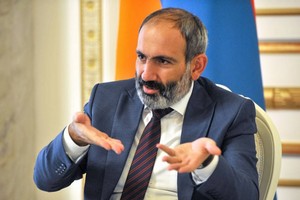
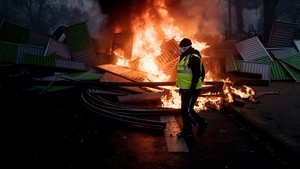
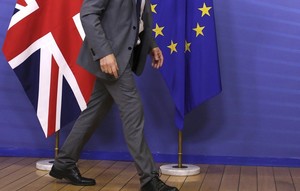
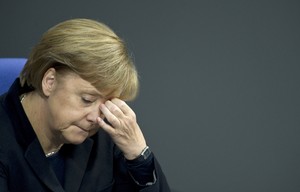
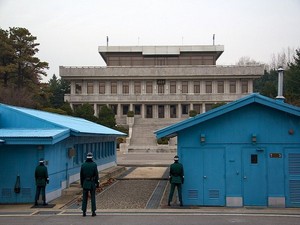
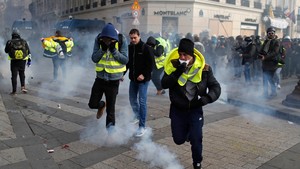
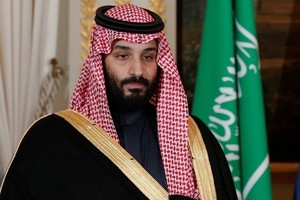

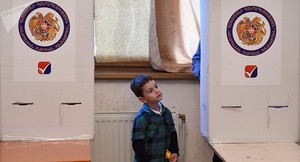
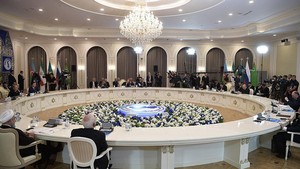
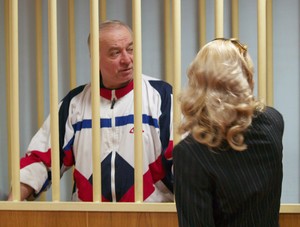
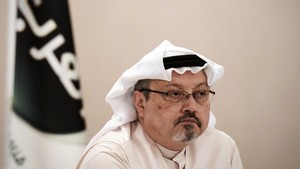


 https://static.report.az/photo/a8ec5736-a50b-4f10-a5e0-4a3031008390.jpg
https://static.report.az/photo/a8ec5736-a50b-4f10-a5e0-4a3031008390.jpg

